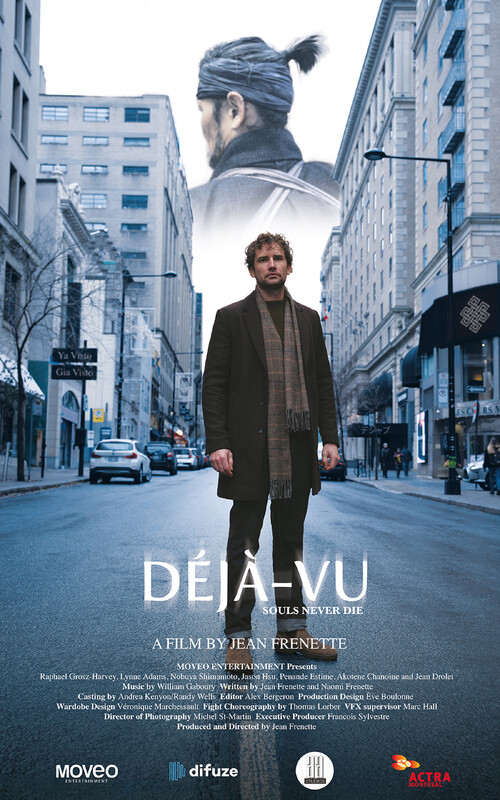Synopsis:
John is convinced he’s been on this planet for longer than his lifetime. This feeling of knowing more than what meets the eye troubles him deeply. To find some peace of mind, he decides to consult an hypnotherapist to dive into his subconscious and get some clarity. This leads him to find some truth in his beliefs: the one that he has been living through multiple bodies, for centuries.

Review by Parker Jesse Chase:
In the action-drama “Déjà Vu,” director Jean Frenette takes the audience on a mind-bending journey through time and consciousness, masterfully exploring the enigmatic phenomenon of déjà vu and past- lives. The film centers on John Monroe (Raphael Grosz-Harvey), a man tormented by a profound sense that he has lived multiple lifetimes. This unsettling feeling propels him to seek answers through hypnotherapy, leading to a revelation transcending his current existence.
The narrative begins with a contemplative John grappling with an inexplicable familiarity of the world surrounding him. His search for clarity brings him to a hypnotherapist’s office, setting the stage for a deep dive into his subconscious. Frenette skillfully utilizes a series of b-roll transition cuts, seamlessly integrating these with John’s voiceover, which draws the viewer into John’s introspective journey through his point-of-view lens.
The film’s depiction of hypnosis is both intriguing and immersive. As John undergoes the session, the story unveils his belief in past lives, supported by vivid, almost surreal, visual storytelling. The Japanese influences (from 1492) presented in the film add a layer of depth and authenticity, enhancing the narrative’s exploration of reincarnation and eternal souls.
One of the standout aspects of “Déjà Vu” is its sound design. The film refrains from excessive or gratuitous action, opting instead for a soundscape that heightens the sensory experience. Every auditory detail—from the subtle ambiance to the intense moments of action—elevates the film, making the viewer feel every moment alongside John.
The film’s visuals are equally compelling. The locations, whether the serene therapy office or the dense, mysterious forest of John’s past life, are meticulously chosen to create a cohesive and immersive world. The cinematography, particularly the extreme close-ups and slow-motion sequences, effectively builds tension and conveys John’s growing paranoia and confusion.
Grosz-Harvey delivers a poignant performance as John Monroe, embodying the character’s inner turmoil and determination with a quiet intensity. The film’s pacing, while brisk, allows for moments of introspection and revelation, culminating in an open-ended conclusion that leaves the audience pondering the nature of time and identity.
“Déjà Vu” is a captivating exploration of the soul’s journey through time, blending action, drama, and philosophical inquiry into a compelling short film. It’s a beautiful piece that not only tells a story but invites the viewer to question the very fabric of their existence. With strong performances, thoughtful direction, and a hauntingly beautiful score, “Déjà Vu” is a testament to the power of short films to leave a lasting impact.